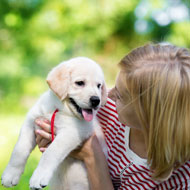‘Puppy talk’ has a functional value, study shows

Puppies were shown to be ‘highly reactive’ to dog-directed speech.
New research has shown that puppies respond positively to the higher pitch, slower tempo speech we direct at them, which is similar to the ‘baby talk’ we use for human infants.
For the first time, scientists have explored why we use ‘dog-directed speech’ and the impact this has on canine behaviour. Their findings have been published in the Proceedings of the Royal Society B.
Human adults often change their speech when talking to babies, adopting a higher and more varied pitch, a slower tempo and clearer pronunciation of vowels. This is known to engage the attention of infants and promote learning.
Thirty female participants were recorded speaking in front of photographs of puppies, adult and old dogs. Researchers analysed the quality of their speech and played the recordings back to dogs, to assess their reactions to dog-directed speech, and normal speech.
The research team found humans used dog-directed speech at dogs of all ages, but they used a higher pitch when communicating with puppies.
Puppies were shown to be ‘highly reactive’ to dog-directed speech, and the pitch was a key factor modulating their behaviour. Researchers say this suggests this type of speech ‘has a functional value in young dogs,’ engaging their attention and promoting human-puppy interaction.
However, older dogs did not react any differently to dog-directed speech, compared with normal speech.
Despite this, study participants continued to use this speech register in older dogs. It is thought pet-directed speech is used as an attempt to communicate with a non-verbal companion. Researchers note that speech is also modified in contexts ‘where the speaker feels, consciously or unconsciously, that the listener may not fully master language…’



 The latest
The latest